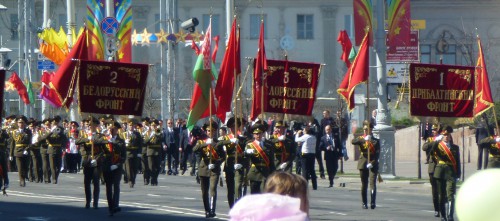24th May 2013
Memory of War
I took part in the Victory Day ceremony in Minsk on 9 May to honour the veterans and fallen of the Great Patriotic War of 1941-45.
The term “Great Patriotic War” sounds strange to us Britons, but we weren’t invaded. Our memory is of the longer period we know as the Second World War (WWII) of 1939-45. But even those dates don’t cover all the related conflicts around the world of that time, such as the Spanish Civil War or Japanese invasion of China.
Regardless of the name, the war on what is now Belarusian territory was awful. During both the fighting and Nazi occupation, millions of soldiers and civilians were killed, including around 800,000 Jewish and other victims of the Holocaust.
In Britain, we honour the sacrifice and bravery of those who died in conflict in November – on the nearest Sunday to 11th November, the date of the Armistice which ended the First World War. This tradition began immediately after the war in 1919 and our remembrance services honour the fallen in all conflicts since 1914.
The huge loss of life on the static lines of the Western Front was particularly traumatic. The slaughter from the new weapons of machine guns and poisonous gas seemed senseless. Even today, there is a lingering collective memory of the waste of young lives, marked by an archipelago of graveyards from the North Sea to the Swiss border.
However, there is a fine line between remembrance and myth. We all prefer to remember the glorious episodes or events that cast our nations in the best light. The reality was often different.
In Britain, we remember WWII for the successful evacuation of about 340,000 Allied troops from the beaches of Dunkirk in June 1940. But that “miracle”, as Churchill described it, was greatly helped by the fierce defence of Lille by French armies at the end of May which delayed the German advance. Churchill acknowledged the French action at the time, but our history books tend to overlook it.
Similarly, “our finest hour” (Churchill’s description again) during WWII was the “Battle of Britain”, the air battle over Britain in the late summer and autumn of 1940 which we thought was a prelude to a Nazi invasion. Britain would not have succeeded without the brave support of the fifth of the fighter pilots who came from such countries as Poland, Canada, New Zealand and Czechoslovakia.
While British troops fought in many theatres around the world, the battles were not as deadly as those in the “Great Patriotic War”. There was a huge loss of life in such as Operation Bagration, the Soviet offensive which cleared the German forces from Belarus in 1944, as well as more widely known battles such as at Stalingrad.
However, these victories don’t disguise the fact that before the Great Patriotic war, the Soviet armies had invaded Poland from the east in September 1939. Even more important is the fact that this action was in collaboration with their eventual deadly enemies, the Nazi regime.
We need to remember both the terrible human costs of war and the “inconvenient truths” of our war record, to have a proper understanding of our past. To adapt the aphorism of another sage (not Churchill), with a fuller understanding of the past, we are less likely to repeat the mistakes of history.

Dear Bruce,
this term “Great Patriotic War ” doesn ´t sound so much wired or “strange ” to me for all those millions of innocent victims had to suffer in a way of which we – in the year 2013 – are hardly able to imagine it. And I ´m thinking not “only ” of these 800.000 holocaust victims. I do have also millions of senseless murdered Russian people in my mind. Of course you are right by repeating this saying “that we need to remember both the terrible human costs of war and the inconvenient truths of our war record , to have a proper (and deeper) understanding of our past. And – in my opinion – this is only possible with a fuller understanding of the past, so we are less likely to repeat once made mistakes in history. Therefore, I do truly believe , do people TODAY need such “MEMORIAL DAYS”. To me, it ´s not such an important thing of how they might sound . It ´s much more the message behind these “slogans” like this one of May 9th, 13 in Minsk.
And I think this message is clear : AVOID those human disasters today and in the future. To conclude : People need maybe exactly such “Big words” for they sometimes need sthg. larger than life to believe in a better and more peaceful future and to handle and act in a more human way .
Best wishes, liebstle Grüßle, Ingo-Steven Wais, Stuttgart